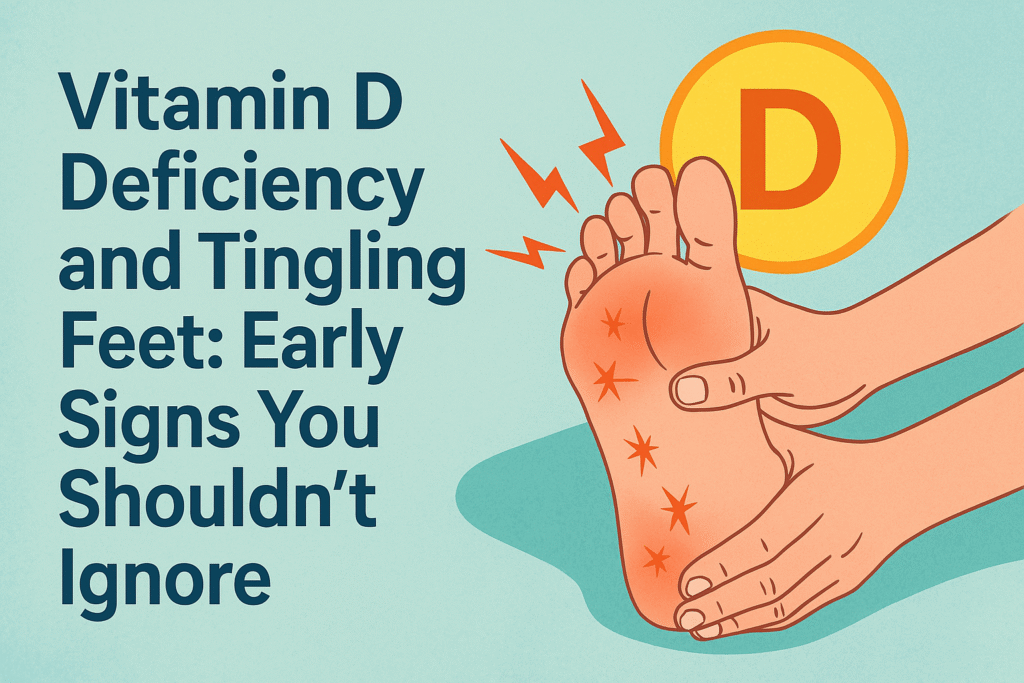
⚠️ Affiliate Disclaimer: This post may contain affiliate links, which means I may earn a small commission — at no extra cost to you — if you make a purchase through one of these links. I only recommend products or services I genuinely trust and believe can provide value. Thank you for supporting My Medical Muse!
7 Alarming Signs of Vitamin D Deficiency and Tingling Feet You Shouldn’t Ignore
Is a Vitamin Deficiency Behind That Pins and Needles Feeling in Your Feet?
You’re walking across the room when suddenly, your foot starts tingling, that strange pins-and-needles sensation that makes you stop in your tracks. At first, you shrug it off, maybe it’s just poor circulation, a pinched nerve, or a quirky posture habit.
But what if it’s more than that? What if your body is quietly trying to send you a message you shouldn’t ignore?
Believe it or not, one of the surprising culprits could be a vitamin D deficiency. Most people think of vitamin D as just the sunshine vitamin that keeps bones strong but its role goes far deeper. It’s vital for your nervous system, immune function, and even mental clarity. When your levels dip too low, your body often gives subtle hints long before you feel anything severe. That odd tingling in your feet? It could be your nervous system waving a red flag.
In this post, we’ll guide you through everything you need to know:
Why vitamin D is critical for nerve health
How a deficiency can trigger tingling, numbness, or burning sensations in your feet
Other early warning signs you might be overlooking
How to test and restore your vitamin D safely and naturally
By the end, you’ll understand what your feet are trying to tell you and what steps you can take to prevent a small signal from turning into a bigger problem.
Table of Contents:
1. Why Is Vitamin D So Important?
2. How Does Vitamin D Deficiency Cause Tingling?
3. Other Common Neurological Symptoms
4. Early Warning Signs of Low Vitamin D
5. Who’s Most at Risk?
6. How to Get Tested
7. How to Restore Your Vitamin D Levels
8. When to See a Doctor
9. Final Thoughts: Don’t Ignore the Signals
Why Is Vitamin D So Important?
Vitamin D is often called the “sunshine vitamin,” and while the nickname hints at its connection to sunlight, it doesn’t capture the full power of this nutrient. Vitamin D is a critical regulator for multiple systems in your body, far beyond just keeping your bones strong.
Its key roles include:
Supporting bone health: Helps your gut absorb calcium and phosphorus, essential minerals for strong bones, teeth, and preventing fractures.
Muscle function: Plays a role in muscle strength and coordination, helping prevent weakness, falls, and cramps.
Immune system modulation: Helps your body fight infections and regulate inflammation.
Nerve and brain health: Supports proper signaling between your brain and the rest of your body, influencing mood, cognition, and motor function.
When your vitamin D levels drop too low, these processes start to falter. Sometimes the signs are subtle, tiredness, aches, or mild mood changes. Other times, the effects can be dramatic. Interestingly, your feet and hands are often the first places you’ll notice changes, making tingling or numbness a potential early warning sign.
Also Read: Everything you need to know about Vitamin D
How Does Vitamin D Deficiency Cause Tingling?
Vitamin D is essential for nerve health, it helps maintain the myelin sheath, the protective coating around your nerves that ensures smooth communication between your brain, spinal cord, and peripheral nerves without enough vitamin D, this insulation can weaken, leaving nerves vulnerable to damage or misfiring.
When deficiency sets in, the nerves farthest from your brain and spinal cord especially those in your feet and hands are the most susceptible. This can result in:
Tingling or “pins-and-needles” sensations (paresthesia)
Numbness
Burning sensations
Heightened sensitivity to touch
Crawling or prickling feelings
In some cases, vitamin D deficiency can mimic peripheral neuropathy, a nerve disorder often seen in diabetes or other causes of nerve damage. The longest nerves in your body are especially vulnerable, which is why your feet may feel it first.
Other Common Neurological Symptoms
Tingling feet might grab your attention, but low vitamin D can influence both the central and peripheral nervous systems, producing a wide range of neurological symptoms. Watch for:
Brain fog or difficulty concentrating
Memory problems
Muscle weakness or twitching
Frequent headaches or migraines
Mood swings, depression, or anxiety
Poor coordination or balance
Muscle cramps in calves or feet
Many of these symptoms overlap with magnesium or vitamin B12 deficiencies, which often occur alongside low vitamin D. That’s why comprehensive testing is essential if you experience multiple warning signs.
Early Warning Signs of Low Vitamin D
Before tingling or numbness appears, your body may already be signaling a deficiency in quieter ways. Keep an eye out for:
Persistent fatigue or daytime sleepiness
Unexplained body aches or joint pain
Frequent infections such as colds or flu
Sweaty scalp, particularly in infants
Poor wound healing
Low back pain or bone tenderness
Low mood or seasonal affective disorder (SAD)
If you notice several of these symptoms together, it’s a strong indication to check your vitamin D levels. Early detection can prevent further nerve or bone complications.
Who’s Most at Risk of Vitamin D Deficiency?
Vitamin D deficiency is far more common than most people realize. According to the World Health Organization, over 1 billion people worldwide have low vitamin D levels. Many of them have no idea until symptoms begin to show up.
You may be at higher risk if any of the following apply to you:
You live in a region with limited sunlight or long winters, where UVB exposure is inconsistent for much of the year
You have darker skin, as higher melanin levels reduce the skin’s ability to produce vitamin D from sunlight
You’re over the age of 50, since the skin becomes less efficient at synthesizing vitamin D with age
You regularly use sunscreen or wear clothing that covers most of your skin
You spend most of your time indoors, including office workers, students, and remote workers
You have kidney or liver disease, which affects vitamin D activation in the body
You have obesity, as vitamin D can become sequestered in fat tissue
You have malabsorption conditions such as celiac disease, Crohn’s disease, IBS, or have had bariatric surgery
Importantly, vitamin D deficiency is not limited to older adults or those with chronic illness. Healthy young adults, new mothers, and children can also become deficient, especially with modern indoor lifestyles.
How to Get Tested
The only reliable way to determine whether vitamin D deficiency is contributing to tingling in your feet is through a blood test.
Ask your healthcare provider for a 25-hydroxy vitamin D test (25(OH)D), this is the gold standard for assessing vitamin D status.
General reference ranges:
30-50 ng/mL: Sufficient
20-30 ng/mL: Insufficient
Below 20 ng/mL: Deficient
Below 10 ng/mL: Severely deficient
Some clinicians, particularly in functional or integrative medicine, aim for 40-60 ng/mL to support optimal nerve, muscle, and immune function.
Because vitamin D works closely with other nutrients, your doctor may also check calcium, magnesium, and vitamin B12, especially if neurological symptoms are present.
How to Restore Your Vitamin D Levels
If your levels are low, there’s good news: vitamin D deficiency is highly reversible with consistent, targeted steps.
Get More Sunlight
Your skin naturally produces vitamin D when exposed to UVB rays. Aim for:
10 to 30 minutes of direct sunlight on arms and legs
Several times per week
Midday sun, when UVB rays are strongest
Avoid sunscreen during this short exposure window, then apply it afterward if you remain outdoors. People with darker skin typically require longer sun exposure to generate the same amount of vitamin D.
Eat More Vitamin D-Rich Foods
Very few foods contain significant vitamin D, but regular intake can still help support your levels:
Fatty fish such as salmon, sardines, mackerel, and tuna
Egg yolks
Beef liver
Cod liver oil
Mushrooms exposed to sunlight
Fortified foods including dairy products, cereals, and plant-based milks
Diet alone is often not enough to correct a deficiency, but it plays an important supporting role.
Take a High-Quality Supplement
Most people with moderate to severe deficiency will need supplementation.
Common dosing guidelines:
1,000-2,000 IU per day for maintenance
5,000-10,000 IU per day for deficiency correction (short-term and under medical supervision)
Choose vitamin D3 (cholecalciferol) rather than D2, as it’s more effective at raising blood levels. Some formulations include vitamin K2, which helps direct calcium into bones instead of soft tissues.
When to See a Doctor
If tingling in your feet persists despite correcting vitamin D levels, further evaluation is essential. Your doctor may need to:
Rule out other deficiencies such as vitamin B12, magnesium, or folate
Screen for diabetes or prediabetes
Check for nerve compression, spinal issues, or herniated discs
Refer you to a neurologist for nerve conduction studies
Early diagnosis matters. When nerve-related issues are identified and treated promptly, nerve damage is often reversible and long-term complications can be avoided.
Final Thoughts: Don’t Ignore the Signals
Tingling in your feet may feel like a small inconvenience, something easy to brush off and forget but your body does not send signals without a reason. That pins and needles sensation can be an early warning, a quiet message that something underneath needs attention.
Vitamin D deficiency often develops silently, it doesn’t announce itself loudly at first. Instead, it shows up as subtle changes in how your body feels and functions. Tingling feet, fatigue, low mood, or muscle weakness are not random. They are clues.
The reassuring part is this, vitamin D deficiency is one of the easiest nutritional problems to identify and correct, with simple steps such as improving sunlight exposure, adjusting your diet, and using supplements when necessary, many people see real improvement before symptoms become long term or damaging.
Do not wait until discomfort turns into chronic nerve pain, do not dismiss repeated symptoms as nothing.
Listen to your body while it is still whispering, small, informed changes today can prevent much bigger problems tomorrow.
👩⚕️ Need Personalized Health Advice?
Get expert guidance tailored to your unique health concerns through MuseCare Consult. Our licensed doctors are here to help you understand your symptoms, medications, and lab results—confidentially and affordably.
👉 Book a MuseCare Consult NowRelated Post:
- Home Test Signs of Iron Deficiency Without Blood Test
- Symptoms of Peripheral Neuropathy: Cold Feet, Tingling, and More
- 10 Gentle Foot Exercises to Improve Circulation and Nerve Pain from Neuropathy
- 10 Powerful Supplements for Diabetic Neuropathy That Actually Work
- Cold Feet from Neuropathy or Poor Circulation? 7 Shocking Differences You Need to Know
- Reverse Neuropathy with Diet: 10 Science-Backed Foods That Heal Nerves
Dr. Ijasusi Bamidele, MBBS (Binzhou Medical University, China), is a medical doctor with 5 years of clinical experience and founder of MyMedicalMuse.com, a subsidiary of Delimann Limited. As a health content writer for audiences in the USA, Canada, and Europe, Dr. Ijasusi helps readers understand complex health conditions, recognize why they have certain symptoms, and apply practical lifestyle modifications to improve well-being


